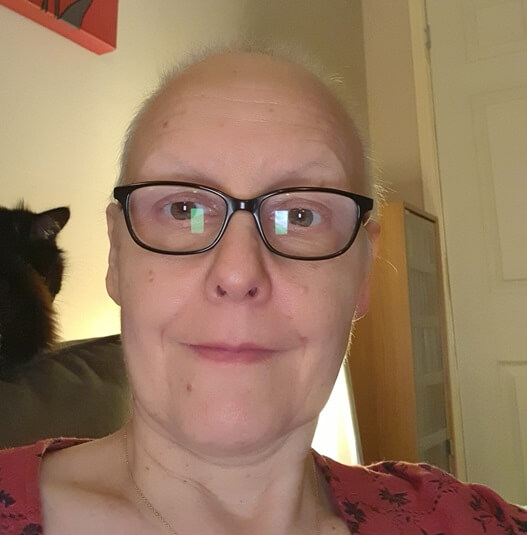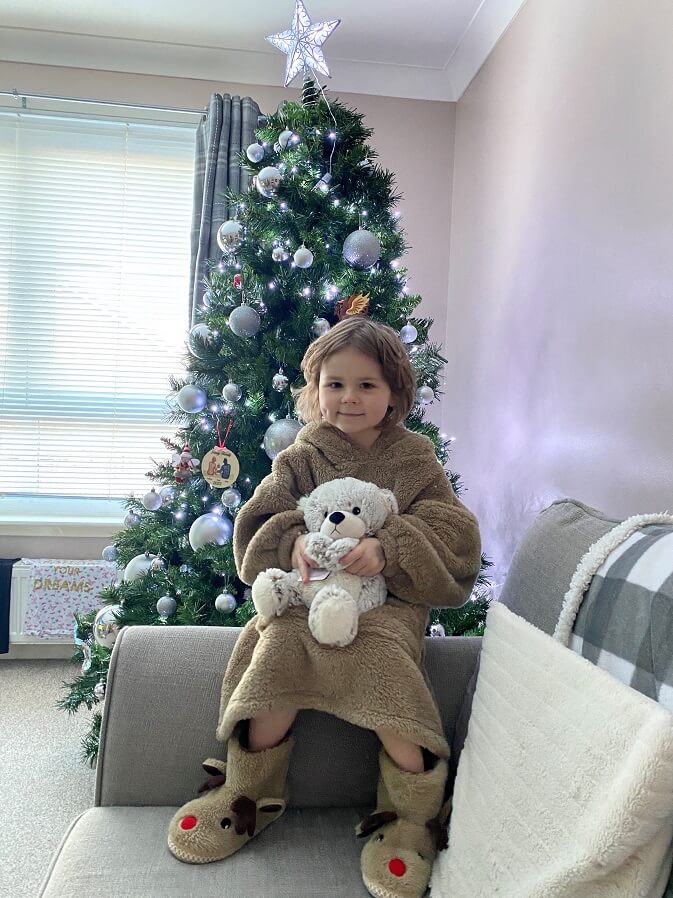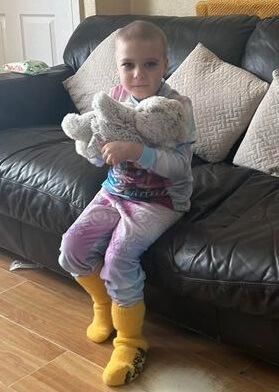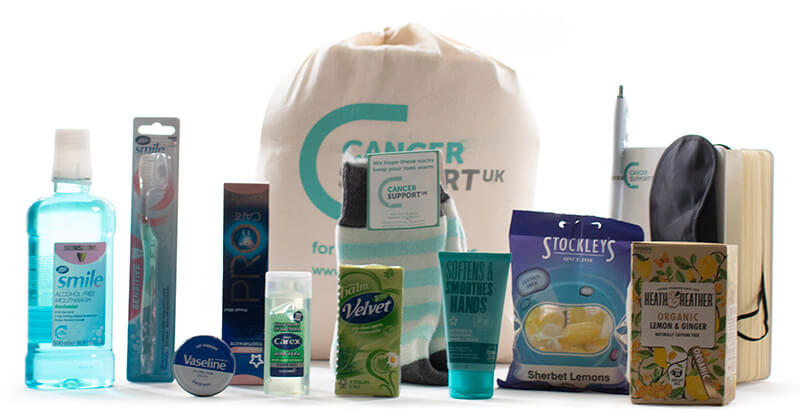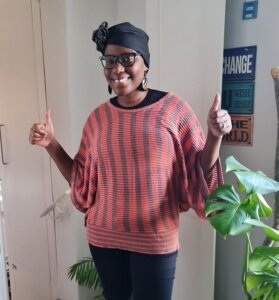 Hilda was just 38 years old when she learned she had bowel cancer in 2021. The diagnosis came as a complete shock as she was physically active and had none of the usual symptoms associated with bowel cancer.
Hilda was just 38 years old when she learned she had bowel cancer in 2021. The diagnosis came as a complete shock as she was physically active and had none of the usual symptoms associated with bowel cancer.
“In June, I started experiencing excruciating back pain and felt tired. I also had non-stop migraines. I had a telephone consultation with my GP, who immediately asked me to come into the surgery. On a Sunday…
This was a life changing appointment for Hilda. Blood tests followed, which showed she was very anaemic. Then a stool sample confirmed that were was blood in her stools, so she was referred for a colonoscopy, which revealed a growth in her colon.
“During the colonoscopy I could clearly see that there was a funny looking thing in my colon. The hospital said it could be a cyst or it could be cancer. In my head I never imagined it could be cancer. So when I heard the diagnosis, I was in shock. How was it possible to have cancer when I was only 38?”
“I was quickly referred to an oncologist, who explained that the tumour was significant and had started spreading, hence the back pain. The treatment plan included chemotherapy to shrink the tumour, followed by surgery. I was ready to sign on the dotted line, I just wanted to get it done.”
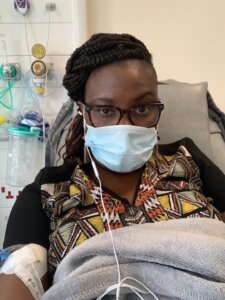 Hilda received chemo treatment every fortnight from August to November, which involved a significant lifestyle change. Major surgery followed in December.
Hilda received chemo treatment every fortnight from August to November, which involved a significant lifestyle change. Major surgery followed in December.
“Recovery from the operation seemed never ending,” she remembers. “So I just focused on getting through it one day at a time.”
After the lymph nodes surrounding the tumour were removed, Hilda thought her treatment was complete. However in March 2022, she had to undergo more chemotherapy. Finally, in June, a further colonoscopy and scans showed she was cancer free.
Adapting to life after treatment proved a challenge for Hilda, both physically and mentally.
“The medication caused weight gain and nobody warns you how tired you will continue to feel. But most of all, I felt like I had been abandoned. When there are no more appointments with chemo nurses, or the surgeon or the Macmillan nurse, you have to start figuring stuff out for yourself. It’s only when you finish treatment that you think about what has happened to you.
“You try explaining your feelings to family and friends, but they don’t really understand the anxiety that you are living with constantly. They regard you as a cancer free person and think you should just move on with your life. But every time you get a letter for your next scan (every three months for three years), you relive the moment when you learned you had cancer. It’s like being traumatised over and over.
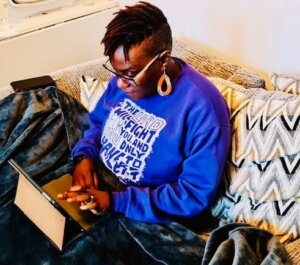 One month after completing her final chemo treatment, Hilda began a phased return to work.
One month after completing her final chemo treatment, Hilda began a phased return to work.
“Having taken nine months off, I found the prospect of returning to work daunting, but it was also good, as cancer causes you to lose your identity. People look at you as a cancer patient and I wanted to get my identity back. It’s a question of striking a balance. I had an occupational health assessment, which helped put things into perspective.
Working from home is a very effective solution for Hilda, as she still struggles with neuropathy in her feet and has anxieties around using public toilets, as her bowel is very unpredictable. She worries about the cleanliness of toilets in the event of her having a bowel emergency and this in turn creates stress and tension.
“Overall, my employers listened to my needs and created a plan for me, which was reviewed every fortnight. When I felt better, my hours were increased. However, there is a subtle pressure to come back into the office, which means hot desking. I worry about whether I will have a desk and a foot rest, which I need as my feet swell if I sit for too long. This anxiety affects me emotionally and then I’m not in a good place to work.
Cancer Coach proved a life changing experience for Hilda.
“I saw an advertisement for Cancer Coach online, offering me the chance to share my experience with other people who really understand what you are going through. There is something about lived experience, it’s like an “ah” moment, like being part of a community.
“The online application process was very simple, which was helpful as I was still suffering from chemo brain. I didn’t know what to expect, but the group was very welcoming and we bonded quickly. There is a common understanding between people who have gone through chemo and surgery, which is difficult to explain.
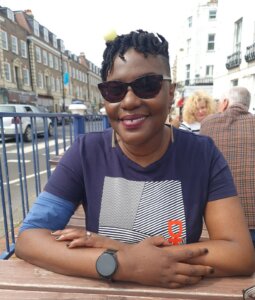 “Sharon, our facilitator, was brilliant and totally judgement free. She encouraged everyone to speak and made sure that we followed the Cancer Coach programme. All the sessions were helpful and the exercises we did in the workbook were very helpful. Sharon encouraged us to try the homework, but there was no pressure to do anything if you didn’t want to.
“Sharon, our facilitator, was brilliant and totally judgement free. She encouraged everyone to speak and made sure that we followed the Cancer Coach programme. All the sessions were helpful and the exercises we did in the workbook were very helpful. Sharon encouraged us to try the homework, but there was no pressure to do anything if you didn’t want to.
“I loved everything about Cancer Coach. It’s a great service and I found it so useful. I really looked forward to my Monday sessions and talking with people who understood me. Not having to pay for support helps, too, especially when you aren’t working.
“I recently recommended Cancer Coach to a friend who has completed their cancer treatment, because Cancer Coach made all the difference to me.”
The Cancer Coach programme is available to anyone previously diagnosed with a stage 3 or below cancer and who has now completed their physical cancer treatment and is experiencing low mood, anxiety, worry, and who doesn’t know how to move forward in their recovery. The course takes participants through a series of weekly facilitated group sessions, run for a six-week period over the telephone or online video. Participants benefit from the peer support of the sessions, as well as learning tools and techniques for improving emotional wellbeing, which can help them on their recovery journey. The course is free, completely confidential and accessible from the comfort and privacy of home. If you’ve completed cancer treatment and are wondering how to cope, then please apply to join the course. Simply complete the application form online. If you have any questions, please email cancercoach@cancersupportuk.org or call: 020 3983 7616.
